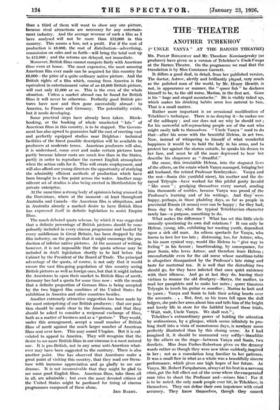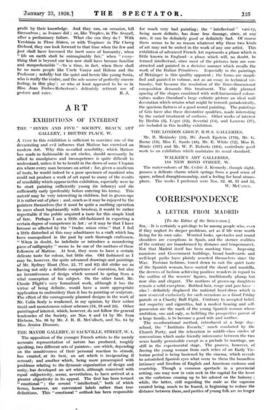THE THEATRE
ANOTHER TCHEKHOIT
(" UNCLE VANYA " AT THE BARNES THEATRE) Mn. PHILIP RIDGEWAY and Mr. Theodore Komisarjevsky (as producer) have given us a version of Tchelchov's Uncle Vanya at the Barnes Theatre. On the programme we read that the translation is by Miss Constance Garnett.
It differs a good deal, in detail, from her published version. The doctor, Astrov, alertly and brilliantly played, very much as the polished man of the -world, by Mr, fienry Hewitt, is
not, in appearance or manner, the " queer fish " he declares himself to be, to the old nurse, Marina, in the first act. Gone is his " huge and stupid moustache." He is visibly tidied up, which makes his drinking habits seem less natural to him. That is a small matter.
Rather more important is an occasional modification of Tchekhov's technique. There is no denying it—he makes use of the soliloquy ; and one does not see why he should not ; for his sorrowful self-reproaching people are of the sort who might easily talk to themselves. " Uncle Vanya " used to do that—after his scene with the beautiful 'Helena, in act two. Now, instead of whispering to himself of what wonderful happiness it would be to hold the lady in his arms, and to protect her against the storms outside, he speaks his dream to her face, and must be all the more depressed to hear her describe his eloquence as " dreadful."
She came, this irresistible Helena, into the stagnant lives of the others, on the estate which Vanya managed, bringing her old husband, the retired Professor Serebryakov. Vanya and the rest—Sonia (his youthful niece), his mother and the de- cayed Telyegin—have worked for this pitiful gouty invalid " like oxen " ; grudging themselves every morsel, sending
him thousandi of roubles, because Vanya was proud, of the Professor's learning and of his writings. And they were happy, perhaps, in those plodding days, as far as people in
provincial Russia (it seems) ever can be happy ; for they had, from day to day, what the typical Tchekhovian character rarely has—a purpose, something to do.
What makes the difference ? What has set this little circle uneasily questioning its own dull rotations ? It can only be Helena, young, idle, exhibiting her wasting youth, dependent upon a sick old man. An odious spectacle for Vanya, who learns to love her too late ; distressing, too, for Astrov, who, in his more cynical way, would like Helena to " give way to feeling " in his favour ; heartbreaking, by consequence, for poor Sonia, who loves Astrov, and therefore fears Helena ; uncomfortable even for the old nurse whose mealtime-table is altogether disorganized by the Professor's late rising and taste for nocturnal tea. It is well that the disturbing two should go, for they have infected that once quiet existence with their idleness. And go at last they do, leaving their victims to resume the old drudgery—Marys, the mother, to read her pamphlets and to make her notes ; queer timorous Telyegin to touch his guitar en sourdine ; Marina to knit and to yawn ; Vanya and Sonia to hide their aching hearts over the accounts. . . But, first, as his tears fall upon the dull ledgers, she puts her arms about him and tells him of the bright and lovely life in store for the faithful beyond these trials. " Wait, wait, Uncle Vanya. We shall rest."1- Tchekhov's extraordinary power of holding the attention by ordinariness, by a glimpse, which seems infinitely to pro- long itself into a vista of monotonous days,. is nowhere more perfectly illustrated than by this closing scene: Xi I had imagined it, it should be murmured very softly-'—ihaudible by the others on the stage—between Vanya and Sonia, twa derelicts. Miss Jean Forbes-Robertson gives us the dreamy words rather as though they were new ideas suddenlxinapired
in her ; not as a consolation long familiar to her patience. It was a small flaw in what as a whole was a beautifully sincere performance, which gives one high hopes of her future. As Vanya, Mr. Robert Farquharson, always at his best in a nervous crisis, got the full effect out of the scene where the exasperated man tries to shoot the Professor and—misses him ! For it is to be noted, the only mark people ever hit, in Tcheldrov, ia _ themselves. They can define their own impotence with cruel accuracy. They know themselves, though - they cannot profit by their knowledge. And they can, on occasion, kill themselves ; as Ivanov did ; or, like Trepiev, in The Seagull, after a preliminary failure. What else can they do ? With Vershinin in Three Sisters, or with Tropinov in The Cherry Orchard, they can look forward to that time when the few and just shall have leavened the inert mass of humanity, when " life on earth shall be unimaginably fair," when " every- thing that is beyond our ken now shall have become familiar and ocunprehensible "-ate a time, in fact, when there shall be no more people like Uncle Vanya and Helena and the Professor ; nobtiily, but the quiet and heroic like young Sonia, who is really theeentre, and the sole source of perfectly sincere feeling, in thi§ • play; or who at least appeared to be so in MisS Jean Forbes-Robertson's delicately reticent use of











































 Previous page
Previous page